June 19, 2025 | 08:01 GMT +7
June 19, 2025 | 08:01 GMT +7
Hotline: 0913.378.918
June 19, 2025 | 08:01 GMT +7
Hotline: 0913.378.918
A green garden with fresh air is the first impression visitors receive upon entering Rom Vang Farm, owned by Nguyen Van Nhan, 30, in Dien Hoa commune, Dien Ban town, Quang Nam province. Rarely did anyone realize that the farm was once a barren, desolate area with ineffective agricultural production, even the locals abandoned it.
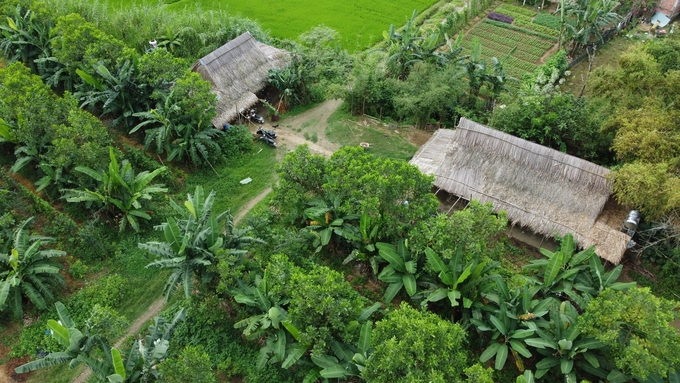
Ecosystems are restored when farming follows nature. Photo: RV.
While we were listening to the story of Rom Vang Farm, we were astonished to know that Nhan was originally a petrochemical engineer. He quit his employment to pursue his passion for agriculture, abandoning the hustle and bustle of the city to live in a tranquil rural area and develop ecological agriculture based on the forest garden model.
The initiative was inspired by "The One-Straw Revolution" by Masanobu Fukuoka, who introduced the natural farming model to Japan and the rest of the globe. In addition, he witnessed the severe degradation of soil in his native country, which was caused by the excessive use of chemical fertilizers and pesticides.
Nhan decided in 2019 to lease a 3.5-hectare plot of land in Dien Hoa commune to actualize his vision. "At the time, the soil was barrenly impermeable and full of chemical remnants. To create arable land, it was essential to renovate the soil and recycle additional nutrients into the soil. The process took time to make the land as naturally fertile as feasible".
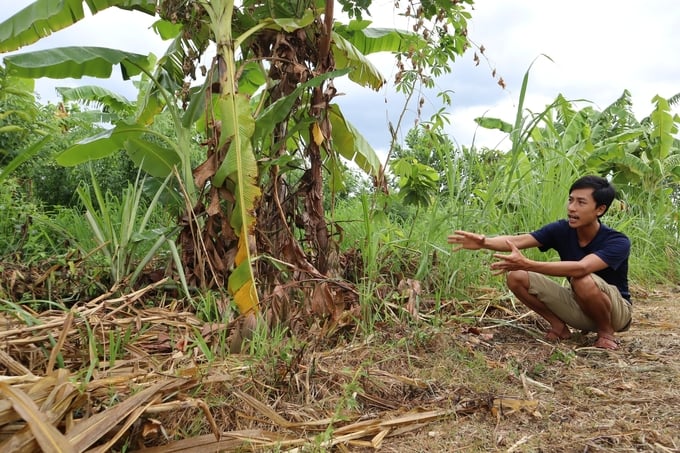
The plants in the ecological agriculture model will support each other to develop and improve the soil. Photo: Le Khanh.
It took two years for the soil to eliminate all chemical residues, but three years to generate organic material and porosity. He planted legumes that add nitrogen to the soil, pruned green foliage to compost and create organic materials, and added a little bovine manure at the same time.
"The farm uses no preparations, inorganic fertilizers, or pesticides in order to reduce initial costs and restore the natural development and self-sustaining ecosystem," said Nhan.
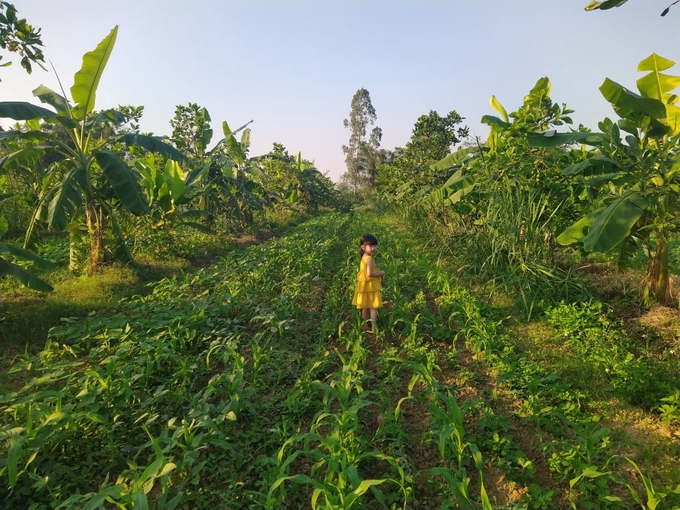
The planting of many types of trees, in addition to providing a variety of income, also reduces the risk of natural disasters. Photo: Le Khanh.
Nhan has precisely designed Rom Vang Farm so that each subdivision serves a distinct purpose and complements the others. The highest location is where the family resides. The forest garden is slightly lower. The livestock area and the field follow. The field is a site where energy and nutrients from the preceding regions can be utilized for development. Lastly, there is a reservoir area for storing groundwater in order to restore the ecosystem.
The primary attraction of the farm would be a 2-hectare forest garden with a variety of fruiting plants, including jackfruit, guava, mango, banana, and short-day crops, defined by distinct canopies. With this setup, space can be maximized while trees complement one another and deter pests' invasion.
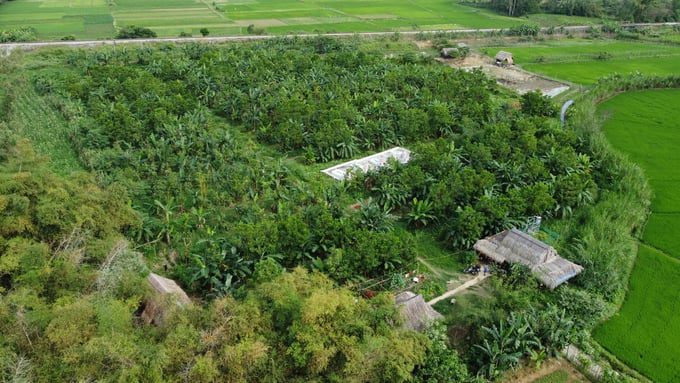
The forest garden is planted with many different types of trees creating many layers of canopy. Photo: RV.
In the initial years, income from short-term commodities such as maize, sesame, and legumes will be used to plant long-term fruit trees. After these trees are harvested, their leftovers will be composted to supplement the forest garden's fertilizer, creating a closed system. When the fruit trees are mature and harvested, biomass and legumes will supplant the short-term crops to continue adding nutrients and organic matter to the soil.
According to Nhan, the forest garden is intended to produce products associated with the delta while preserving the canopy layer, thereby reintroducing the forest to the delta. "This is the narrative in terms of ecology and livelihoods, particularly in the lowlands that are being engulfed by an enormous urbanization rate. No one believes that there is a forest nursery near the city that helps to preserve the vanished ecosystem".
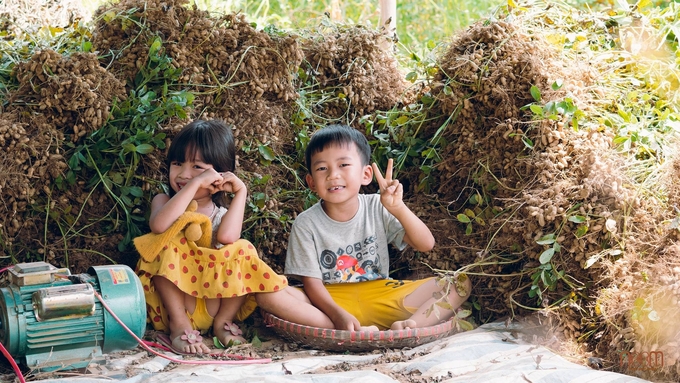
Agricultural products produced in accordance with the natural ecological model have very low costs, primarily labor, but their value and profit are multiplied by a large amount compared to conventional agricultural practices. Photo: Le Khanh.
The restored ecosystem fosters biological diversity and natural enemies, thereby establishing a natural food chain and eradicating parasites and diseases. In addition to establishing a natural ecosystem, according to Nhan, administrators must also comprehend the behavior and development principles of crops. Certainly, parasites and diseases will affect the crops in the model. This is not a disease that must be controlled, but it does help eradicate weak plants so that robust plants can produce greater yields.
The young owner of Rom Vang Farm stated that two factors must be prioritized in order to develop a successful forest garden farming model. The first element requires technical expertise. In this case, the technique includes not only the implementation method but also the identification and analysis of the current condition of the property on which the model will be deployed. From there, maximize the advantages and address the challenges, and fill in the gaps to achieve the utmost level of efficiency.
The second step is to establish a long-term, stable output market. "The objective of this market is to connect production with purchasing partners or to establish market communication for themselves. I perform well and am able to effectively communicate products that many individuals are prepared to purchase at premium prices.
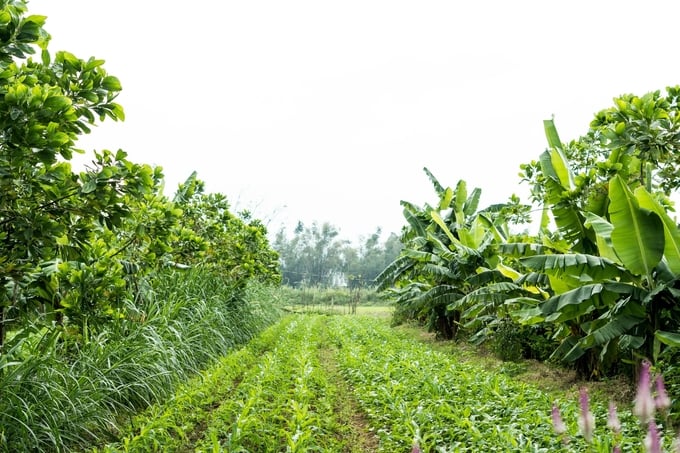
Intercropping and multi-cropping is the form that Rom Vang Farm always applies. Photo: Le Khanh.
Managers must comprehend sustainable building practices. To sustain long-term products, short-term products are required. On the other hand, if there is a strong market but the wrong technique is used in accordance with the natural method without ensuring quality, and it is discovered, the brand will suffer and consumers will lose faith. "As a result, it will no longer be able to develop," Nhan said.
Translated by Linh Linh

(VAN) To address plastic pollution, closing the plastic recycling cycle will bring significant economic and environmental benefits.

(VAN) According to the Binh Thuan Department of Industry and Trade, in the first five months of 2025, Binh Thuan's dragon fruit export turnover increased by 20.65% compared to the same period last year.

(VAN) EU countries on Thursday gave final approval to new tariffs on fertilizer imports from Russia, a move aimed at cutting off revenue that could support Moscow’s war in Ukraine, despite concerns from European farmers.

(VAN) The working delegation from the Ministry of Agriculture and Environment conducted an important trip to the Netherlands to strengthen strategic partnerships and sustainable development in the agricultural sector.

(VAN) The letter ‘A Plea from the Ocean’ not only evokes emotion but also awakens the human conscience to the responsibility of protecting life on Earth.

(VAN) The Department of Agriculture in South Africa has announced the country’s first mass vaccination of poultry to prevent local birds from contracting avian influenza.

(VAN) Establishment of the Mekong Delta Regional Agricultural Linkage Center, aiming for a closed value chain, deep processing, trading platforms, and international market connectivity.